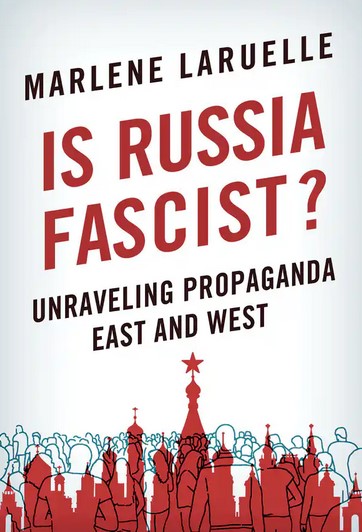Is Russia Fascist? Unraveling Propaganda East and West

The charge of "fascism" has become a strategic narrative of the current world order.
Vladimir Putin's regime has increasingly been accused of embracing fascism, supposedly evidenced by Russia's annexation of Crimea, its historical revisionism, attacks on liberal democratic values, and its support for far-right movements in Europe. At the same time, Russia has branded itself as the world's preeminent antifascist power because of its sacrifices during the Second World War while it has also emphasized how opponents to the Soviet Union in Central and Eastern Europe collaborated with Nazi Germany.
Marlène Laruelle closely analyzes accusations of fascism toward Russia, soberly assessing both their origins and their accuracy. By labeling ideological opponents as fascist, regardless of their actual values or actions, geopolitical rivals are able to frame their own vision of the world and claim the moral high ground. Through a detailed examination of the Russian domestic scene and the Kremlin's foreign policy rationales, the author disentangles the foundation for, meaning, and validity of accusations of fascism in and around Russia.

Available in:
Regions and themes
Share
Related centers and programs
Discover our other research centers and programsFind out more
Discover all our analysesRussia, the Palestinians and Gaza: Adjustments after October 7th
The Soviet Union (USSR), and subsequently the Russian Federation as its internationally recognized legal successor, has consistently sought to play a visible role in efforts to resolve the Israeli-Palestinian conflict.
Deathonomics: The Social, Political, and Economic Costs of War in Russia
The report attempts to outline and examine a truly new phenomenon in Russian society, dubbed “deathonomics”—the making of a mercenary army against the backdrop of the Kremlin’s war in Ukraine, eventually replacing both the Soviet (conscript) and early new Russian (contract) armies. It notes that, by the end of 2023, this trend had turned the military service into one of the highest-paying professions in the country, something not seen in Russia on such a scale since the late 17th century.
Russia's Asia Strategy: Bolstering the Eagle's Eastern Wing
Among Russia’s strategic priorities, Asia traditionally played a secondary role compared to the West. In the mid-1990s, then Foreign Minister Yevgeny Primakov initiated a rapprochement with China and India. Then, in 2014, deteriorating relations between Russia and the West prompted Moscow to begin its “great pivot to the East”.
Kazakhstan After the Double Shock of 2022: Political, Economic and Military Consequences
The year 2022 represented a dual shock for Kazakhstan. In January, the country faced its most severe political crisis since independence, followed in February by Russia’s full-scale invasion of Ukraine, which cast uncertainty over the borders of post-Soviet states. These consecutive crises profoundly shaped Kazakhstan’s domestic and foreign policy.












